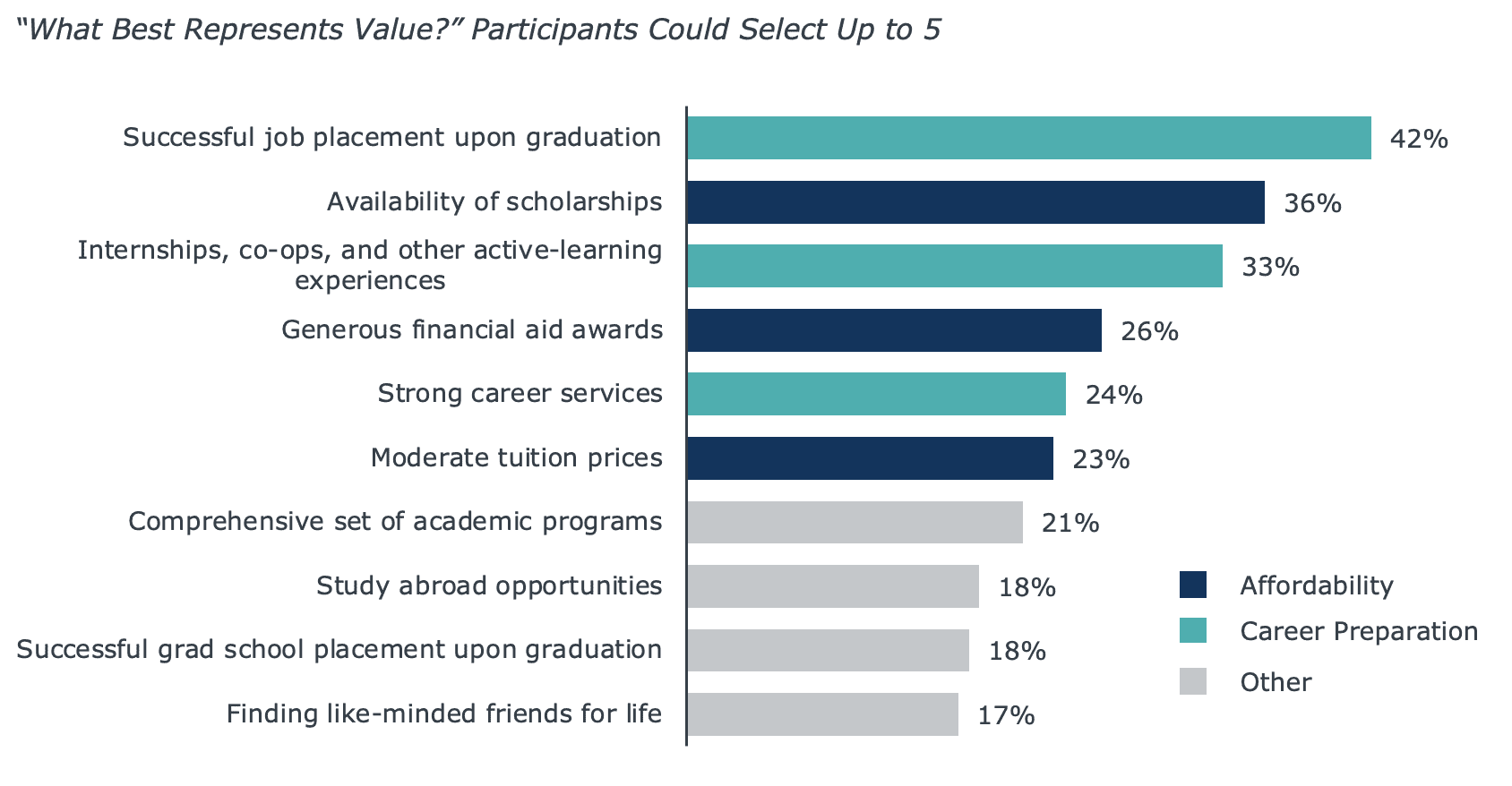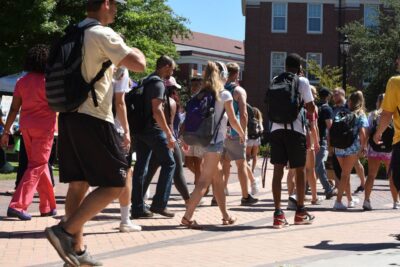Is your institution ‘Gen P’ ready?
Generation Pandemic (“Gen P”) are the cohort of students whose high school years were significantly influenced by COVID-19. Given the prolonged disruption they faced, it’s unsurprising that their college-going behavior differs from that of their predecessors. My team has worked with an increasing number of institutions that are seeking to re-center their student success strategies around a more holistic definition of the student experience.
This summer, my friends on EAB’s enrollment research team surveyed over 20,000 high school students to gather insight into recruiting Gen P. The results give us visibility into what institutions must do to both enroll and retain these students. Read on for five key insights and recommendations to ensure Gen P’s success in higher education.
Read EAB’s insight paper on how to tailor your recruitment strategy for Gen P
Gen P students are…
1. Focused on mental health
While student mental health concerns have been growing for years, they have been significantly exacerbated by the stressors of the pandemic. Mental health concerns now beat academic and financial concerns in drivers of why students are considering leaving college. According to our survey, 22% of high school students named “Not Mentally Ready” as their reason for opting out of college altogether—an 8% increase from pre-pandemic times. For those who do attend college, as many as three in four students are now saying that they considered leaving college at some point over the last six months due to emotional stress.
Student success technology, like EAB’s Navigate360, helps schools connect students with the support resources already available on their campus.
Strategies for supporting Gen P
Hand Raise: The “Hand Raise” feature within Navigate360 can empower students to signal when they require assistance or are experiencing emotional distress. This simple but effective tool allows the institution to reach out discreetly, as only designated staff members are alerted when someone raises their hand—initiating a timely response from counseling or support services.
Coordinated Care: Streamlining the coordination of care between various support entities within the institution can significantly benefit students. Technology can facilitate seamless communication among academic advisors, counselors, and health professionals, ensuring that students receive comprehensive and holistic support.
Surveys and Polls: Leveraging technology to administer regular mental health surveys and polls can help identify students needing early on. These surveys can gauge students’ emotional well-being and provide valuable data for tailoring support programs to their specific needs.
Automated Messaging: Send automated, timely reminders and encouraging messages to students who may be facing emotional stress. These messages can direct them to resources, offer coping strategies, or simply provide a reassuring presence during challenging times.
How schools are expanding student mental health support
2. Missing crucial academic preparation
The pandemic exacerbated an already downward trend of proficiency levels among students. Many students missed crucial classroom experiences or faced challenges with remote learning, creating gaps in their educational foundation. The NAEP’s Long-Term Trend Assessment recorded a five-point drop in average assessment scores from 2020 to 2022—the largest drop ever recorded.
Pandemic learning loss likely to have long term-effects:
75%
Never reach reading proficiency in future grades4x
More likely not to graduate from high school on time54%
Less likely to enroll at a college or university after high schoolThis learning gap has caused heightened performance anxiety among students. Twenty-six percent of students surveyed cited ‘concerns about success in college’ as a top worry, trailing only affordability and cost concerns. To ensure their academic success, institutions must deploy support strategies aimed at addressing the gaps in academic preparation.
Strategies for supporting Gen P
Remedial/Bridge Programs: Offering remedial courses or bridge programs can provide essential skills and knowledge students missed due to pandemic disruptions. These programs help students bridge gaps in their learning.
Personalized Academic Advising: Personalized academic advising is crucial in guiding students toward the right courses and resources to help them catch up and succeed academically. Under this methodology, the institution provides tailored support to address individual needs.
Early Alerts: Early alert systems are essential to ensure students don’t fall behind academically. These systems help identify students who may be struggling and provide timely interventions to keep them on track.
Why unfinished learning is a lurking threat to student success in the late 2020s
3. Eager for in-person events and experiences
While the pandemic forced a shift to virtual events and remote learning, survey data shows that Gen P is eager for in-person events and experiences on college campuses.
-
58%
reported virtual event show rates were DOWN in 2022.
-
38%
reported in-person event show rates were UP in 2022.
The eagerness for physical interaction and engagement among students presents a promising opportunity for institutions to foster a sense of belonging on campus. Research consistently tells us that a student’s sense of belonging on campus is crucial for student success, persistence, and mental health.
Learn more about the 5 components of student belonging
4. Arriving with high standards for digital experiences
Gen P are digital natives and have high expectations for digital experiences. The pandemic accelerated the adoption of technology in education, and students now expect seamless digital interactions and user-friendly platforms. In 2023, students continue to show a similar level of interest in requesting virtual campus tours (24%) as they did in 2021 (25%) — when virtual tours were the only option available.
The digital comfort of Gen P underscores the importance of institutions being well-prepared to provide digital solutions and personalized tech-enabled experiences across the entire student lifecycle, including enrollment, social activities, and career preparation.
Strategies for supporting Gen P
Administrative Process Mapping: Students expect the ability to efficiently manage administrative tasks themselves through digital platforms, emphasizing the need for user-friendly, self-service options. However, when digitizing your administrative processes, it’s important to engage in “process mapping” first to understand the pain points in your current system. This will help you avoid simply creating digital versions of imperfect processes. Download the process mapping tool here.
Efficient Email Campaigns: Navigate360’s email campaign automation tools are tailored to empower your team in efficiently executing persuasive email outreach. It’s essential that your messaging is deliberate; click here to explore how to implement equity-based communication strategies.
Personalized Interactions: Using data to personalize interactions with students, such as employing individualized nudges to guide them toward the resources they need, can enhance their engagement and success.
Explore our latest research and guidance on delivering a “modern student experience” in this resource center.
5. Questioning the value of a college education
The most concerning trend is the increasing number of students questioning the value of a college education. Gen P is more likely than previous generations to express concerns about the affordability and the overall value of higher education. We witnessed a significant rise in the number of students saying college is “not worth it” during the height of the pandemic, and they have continued to increase this year.
Of students not pursuing college immediately after high school, the percentage of students that say college is 'not worth the cost of attending' as their reasoning:
8%
in 201917%
in 2021 (mid-pandemic jump)20%
in 2023According to our survey, students increasingly value work experience, job placement, and career outcomes in higher education. This trend started before the pandemic and has grown in recent years. Additionally, students prioritize affordability and career preparation in their ideal college experience.

Because Gen P sees career preparation as the primary value driver, institutions should emphasize job placement, internships, and career services.
Strategies for supporting Gen P
Tailored Career Exploration: Utilize students’ career goals to shape their program choices early in their college journey.
Showcase Resources: Ensure students are well-informed about the resources provided by your career center. Enhance accessibility by linking the career center to the Navigate360 app homepage for seamless student access.
Getting equipped for Gen P—and the generations after
Ensuring Gen P’s success in college requires a multifaceted, coordinated approach. These insights were drawn from Gen P’s unique behavior, but investing in these enhancements to student success will benefit every future student. By acting upon these vital insights, colleges and universities will be well equipped to support Gen P as they seek out the future that higher education promises.

More Blogs

Career readiness can’t wait until junior year

What matters to student success teams in 2026

Five trends that give community colleges a surprising edge in 2026
Great to see you today! What can I do for you?